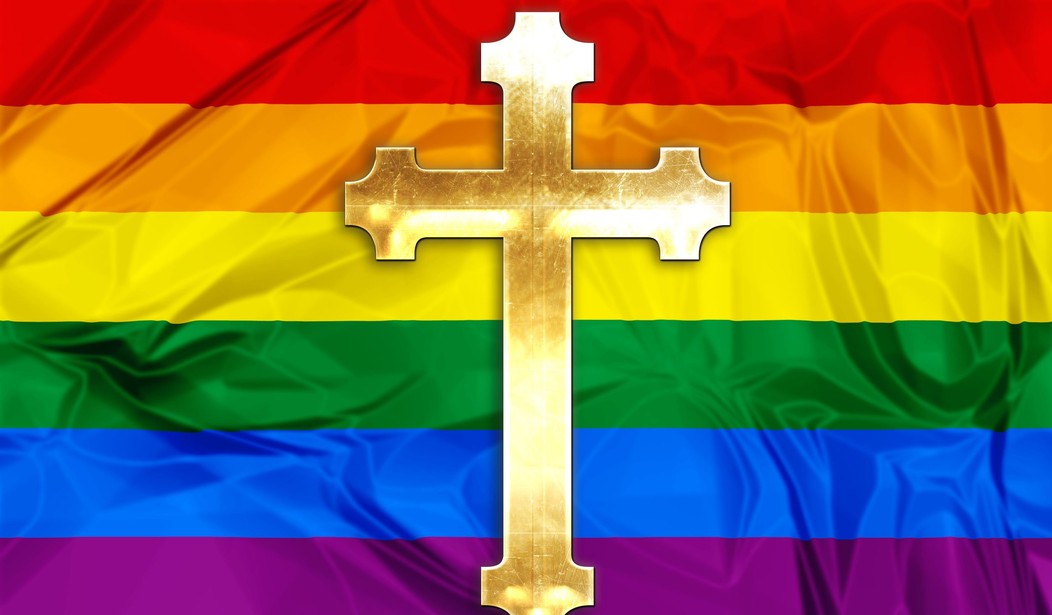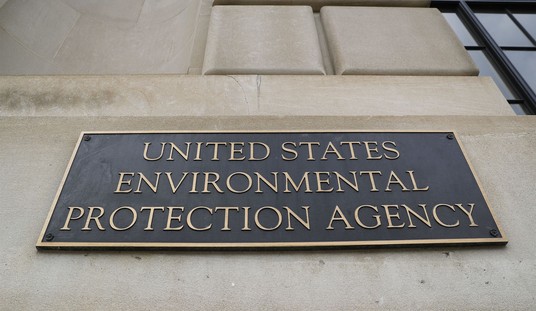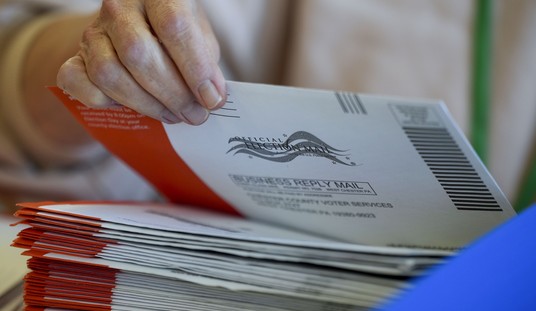The boards of two massive evangelical Christian organizations — the Council for Christian Colleges and Universities (CCCU) and the National Association of Evangelicals (NAE) — have backed a call for compromise on protections for lesbian, gay, bisexual, and transgender people (LGBT) without yielding on religious freedom protections. Many Christian leaders have condemned this effort, termed “Fairness for All” (FFA).
Greta Hays, a CCCU spokeswoman, confirmed to PJ Media that the latest FFA vote among board members came in August, and that the council has considered this approach for “3.5 years,” as far back as June 2015. A member of the NAE board confirmed a WORLD Magazine report that their unanimous vote in favor of FFA occurred in October.
“Fairness for All legislation is coercive, it’s unjust, it’s unjustified, it’s unnecessary, and it imposes new restrictions on freedom of action by many if not most Americans,” Greg Baylor, senior counsel at Alliance Defending Freedom (ADF) and director of the Center for Religious Schools, told PJ Media.
Johnnie Moore, founder of the KAIROS Company and a member of the NAE board, called this kind of criticism hyperbolic. He insisted that this strategy does not compromise religious freedom.
“I don’t intend on compromising on religious freedom but I don’t believe you have to compromise to engage in this conversation,” Moore told PJ Media. He noted that neither NAE nor CCCU has a concrete piece of legislation.
“I think too many people are hyperventilating over hypothetical scenarios, and until there are words on a page we can actually look at and make determinations about, everyone is jumping to premature conclusions,” Moore argued.
The Fairness for All motion, passed on October 2, 2018, and obtained by WORLD Magazine‘s J.C. Derrick, calls on Congress to consider federal legislation with three components:
- We believe that God created human beings in his image as male or female and that sexual relations be reserved for the marriage of one man and one woman.
- We support long-standing civil rights laws and First Amendment guarantees that protect free religious exercise.
- No one should face violence, harassment, or unjust discrimination on the basis of sex, sexual orientation, or gender identity.
Conservative Christians firmly support both of the first two provisions, and agree with the vast majority of the third. The difficulty lies in the definition of “unjust discrimination,” a vague term that means different things to different people.
Many conservatives warn that LGBT activists would push the boundaries of “unjust discrimination” to include bakers, florists, and photographers opting out of lending their artistic efforts to celebrate same-sex weddings. Laws to specifically protect this kind of free speech are frequently derided as pushing a “license to discriminate.”
In reality, conservative Christian bakers like Jack Phillips — whose Supreme Court case Masterpiece Cakeshop v. Colorado Civil Rights Commission (2018) focused on this situation — gladly serve people who identify as LGBT, but refuse to use their art to celebrate LGBT events. This arguably falls under free speech protections, but LGBT activists aim to prevent it by employing harsh non-discrimination laws.
Why would CCCU and NAE — both conservative Christian organizations that firmly uphold marriage as between one man and one woman and sex as biologically determined — call for such a law? They believe a federal sexual orientation and gender identity (SOGI) non-discrimination law is inevitable, and they want to get religious freedom protections featured in the eventual law.
This kind of effort actually began before Obergefell v. Hodges (2015) legalized same-sex marriage across the country. The Church of Jesus Christ of Latter-day Saints (LDS) supported a compromise measure that passed in Utah in early 2015. Many LGBT groups condemned similar efforts, and even the Human Rights Campaign (HRC), which celebrated the law’s passage, called for eliminating religious liberty protections in later bills.
CCCU and NAE debated Fairness for All in 2016, when it seemed like Hillary Clinton would soon become president. Not only was HRC leading other groups in pushing the Equality Act, which would undermine key religious freedom protections in the 1993 Religious Freedom Restoration Act (RFRA), but Indiana had caved on its own RFRA, and Clinton seemed set to name Supreme Court justices.
Yet both evangelical groups still favored Fairness for All after Donald Trump pulled out his surprise victory in 2016. Last year, 75 religious leaders responded with their own anti-SOGI statement, “Preserve Freedom, Reject Coercion.”
After Trump’s victory, the courts have balanced out and even tilt in a conservative direction, giving hope for religious freedom victories like Masterpiece Cakeshop. Even so, an NAE board member told PJ Media that he would rather not put all his eggs in the legal basket.
Republicans hold the presidency and the U.S. Senate, but no political situation lasts forever. It remains feasible that Democrats will eventually take over the levers of power and pass a bill like the Equality Act.
“The most viable political strategy is for comprehensive religious freedom protections to be combined with explicit support for basic human rights for members of the LGBT community,” Shirley Mullen, president of Houghton College and member of the NAE board and executive committee, argued.
Mullen claimed that “these rights include basic legal and human rights related to housing, credit, jury duty and employment — and do not imply affirmation for particular lifestyle or moral choices.”
Many conservatives, argue, however, that adopting any kind of SOGI law would necessarily imply that kind of affirmation.
“The supporters of many SOGIs hope and desire that the legislation they support will send a message about acceptability, the positive good of transgenderism and homosexual behavior,” ADF lawyer Greg Baylor told PJ Media. “These laws in large measure are designed to send a message … that people who dissent from the emerging cultural consensus on these issues are bigots, and that is not the case and it’s damaging for legislation like this to pass because it sends that kind of message.”
Baylor would know. Alliance Defending Freedom has been marked as an “anti-LGBT hate group” by the Southern Poverty Law Center (SPLC), which lists such groups along with the Ku Klux Klan, deliberately blurring the lines between speech and violence. The SPLC’s “hate map” inspired a terrorist attack at the Family Research Council (FRC) in 2012, and the SPLC has not removed the FRC from its map.
Using the SPLC’s smear, mainstream media outlets have blasted ADF as a “hate group,” leading former attorney general Jeff Sessions to disavow the SPLC and emphatically declare that ADF — a Christian legal non-profit that has won nine Supreme Court cases in seven years — is nothing like a “hate group.”
Tactics like those of the SPLC — which are echoed throughout the LGBT activism sphere — demonstrate that it is naive to trust that LGBT activists will abide by any sort of compromise.
Furthermore, Jack Phillips’s legal troubles are far from over. While the Supreme Court ruled in his favor earlier this year, the Colorado Civil Rights Commission again found probable cause that Phillips had discriminated against a transgender lawyer by refusing to bake a cake celebrating a gender transition. Worse, the mainstream media twisted the story to present Phillips as the aggressor.
“It has long been the goal of many supporters of LGBT rights to create an equation in the minds of the general public and in the law between people who hold traditional views about marriage, sexual morality, a distinction between the sexes … and racists,” ADF’s Baylor explained. “That is obviously an unfair, inappropriate, incorrect comparison, but the adoption of these bills does advance that goal.”
He further argued that “SOGIs are unnecessary because there is not evidence of widespread and unjust discrimination against people who identify as LGBT.” For instance, when bakers like Jack Phillips refused to serve same-sex weddings, the same-sex couples were able to order cakes elsewhere. Baylor referenced Andrew Koppelman, a liberal scholar who argued that this issue exposes a “major flaw in progressive thought.”
Baylor also insisted that a federal SOGI is far from inevitable. “No state other than Utah has adopted a state-wide SOGI since 2013,” he noted. (Some states have expanded their laws to include transgenderism, however.) “In our view, the idea that they are inevitable is just incorrect. The lack of momentum in the states confirms that view.” Congress’s inability to pass legislation further suggests that no such law is inevitable.
“We are not ready to declare defeat based on hypothetical circumstances that may never come to pass,” the ADF lawyer said.
Even if such a law were inevitable, that would not make it a good idea — especially for America’s ability to engage in political debate.
“Legislation like Fairness for All certainly does not help the conversation,” Baylor argued. “If nothing else, it imposes on most of the country a pretty radical understanding of gender identity. It imposes a gender identity nondiscrimination obligation on employers, on businesses, and on recipients of federal assistance, which includes most colleges and every public school in the country.”
Finally, Baylor shot down the idea that a federal SOGI with protections for religious freedom would become some “grand compromise that puts this in the rear-view mirror.”
“History tells us that contentious issues like these frequently are debated for decades and longer,” he said, noting that some thought Roe v. Wade (1973) would settle the abortion issue, a debate that remains unsettled to this day.
While FFA supporters claimed that Christian colleges are particularly vulnerable to SOGI non-discrimination laws, opponents like Southern Baptist Theological Seminary President Al Mohler argued that the truly vulnerable are everyday Christians who would not have the money or time to pursue a long legal battle.
This FFA proposal is arguably a bad strategy, but conservatives should consider other alternatives to the religious freedom legal strategy. America’s moderates might be amenable to religious freedom arguments if Christians explain that Muslims also need the ability to opt out of same-sex weddings, and that they have no opposition to serving and respecting LGBT people in usual circumstances.
Follow the author of this article on Twitter at @Tyler2ONeil.









Join the conversation as a VIP Member